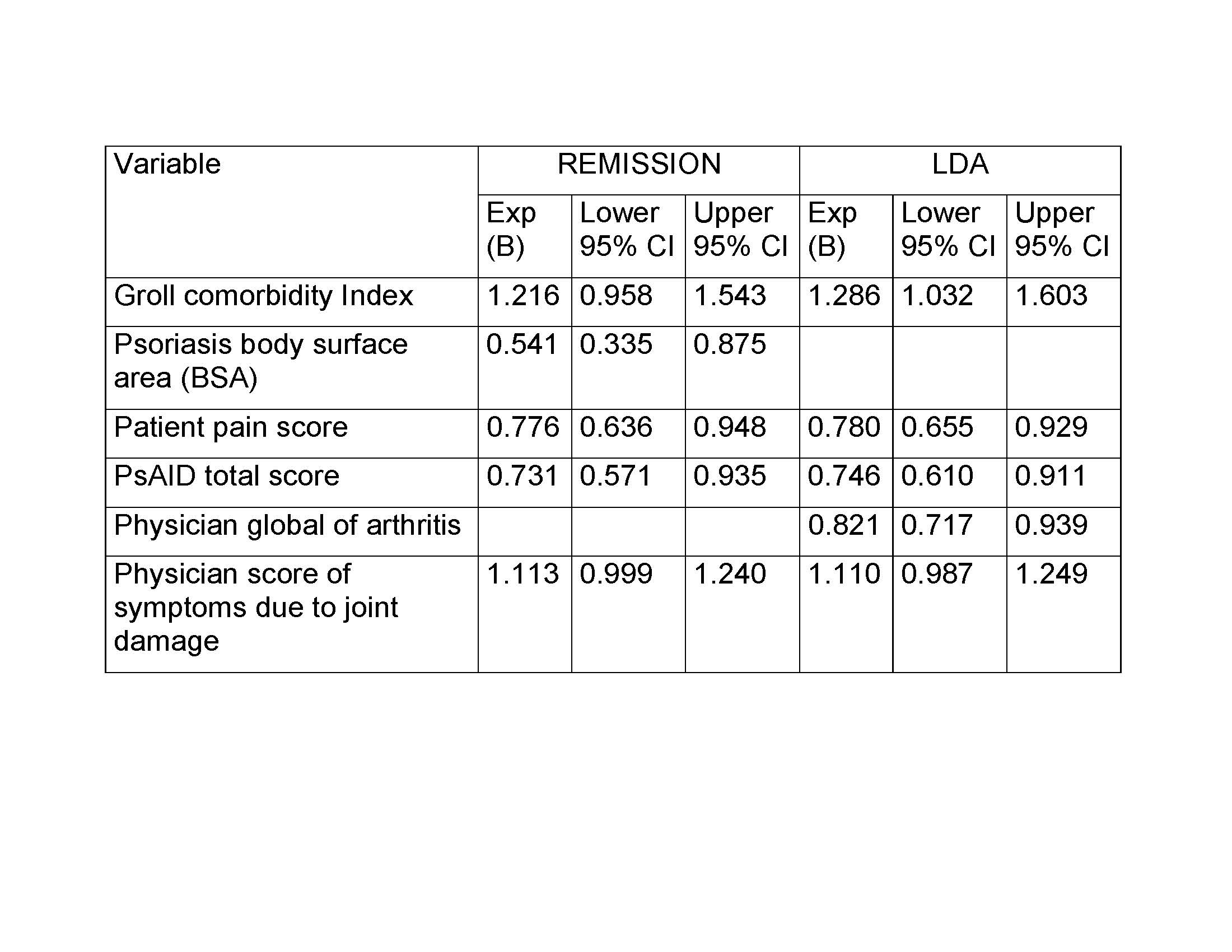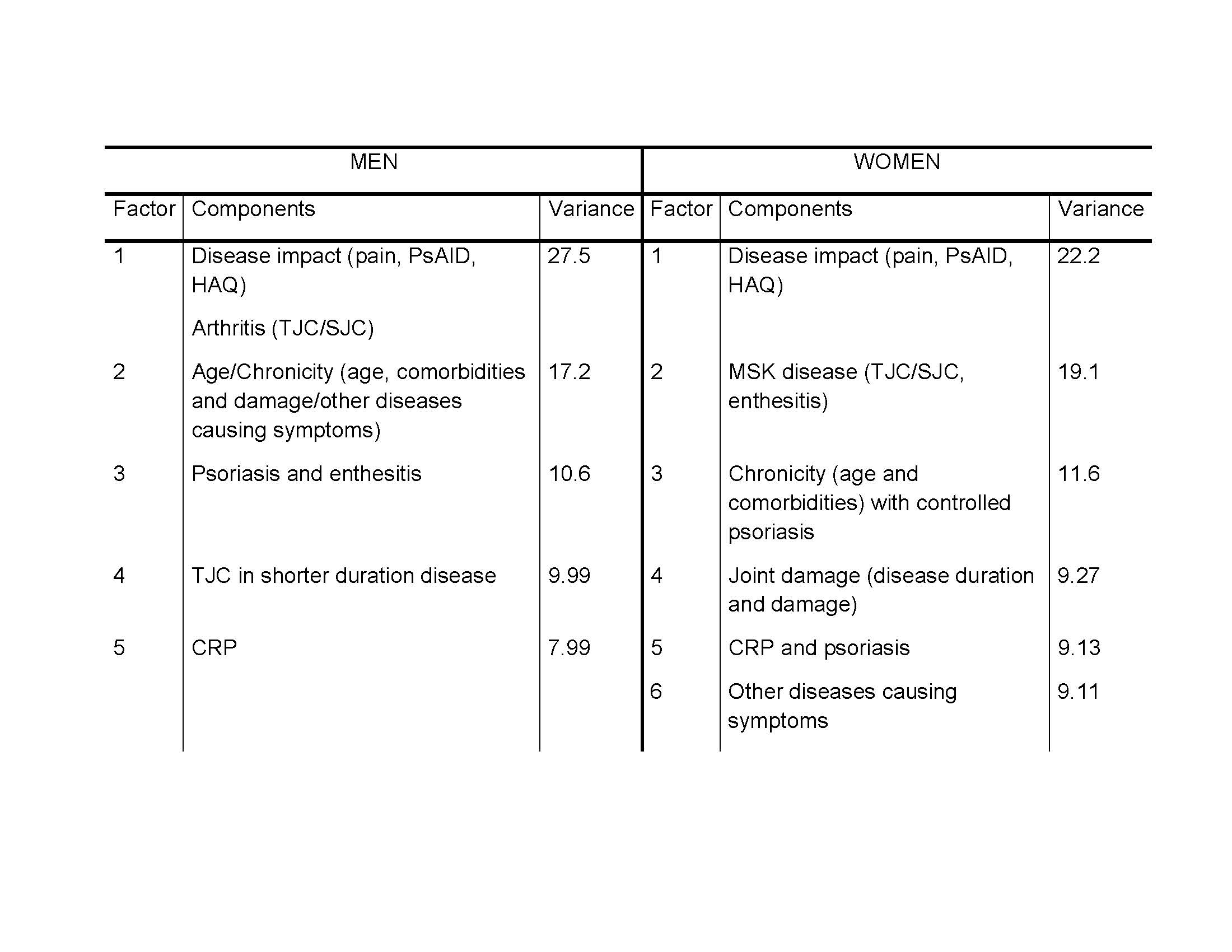Session Information
Session Type: Poster Session (Tuesday)
Session Time: 9:00AM-11:00AM
Background/Purpose: In psoriatic arthritis (PsA), the objective of treatment is remission or low disease activity (LDA), but there is little research into patients’ perception of remission. The aim of this analysis was to identify which factors associate with patient-defined remission.
Methods: This is an analysis of ReFlap (NCT03119805), a cross-sectional international study of consecutive adult patients with PsA > 2 years of disease duration. Remission was defined by a positive response to the question “At this time, is your psoriatic arthritis in remission, if this means: you feel your disease is as good as gone?”; LDA by the question “At this time, are you in low disease activity, if this means: your disease is in low activity but it’s not as good as gone?”.
Potential variables that may associate with the opinion of remission/LDA were analysed using stepwise multivariable logistic regression. Variables were demographic (age, gender, disease duration, Groll comorbidity index), disease-related (joint counts, psoriasis body surface area (BSA), enthesitis, CRP), patient-reported outcomes (pain, PsAID, HAQ) and physician opinion of cause of symptoms (physician score for symptoms due to PsA, to joint damage or to other disease all scored 0-10). Due to high levels of correlation between variables, principal component analysis (PCA) was used to explore clustered components associated with remission/LDA. PCA was used to extract factors with orthogonal rotation. Factors with an eigenvalue of ≥1 were included.
Results: Among 466 recruited cases, 31 did not meet inclusion criteria and 11 had missing data leaving 424 for analysis. A total of 94 (22.2%) patients self-classified as remission and 285 (67.2%) as low disease activity or remission.
When exploring factors associated with patients’ opinion of remission in multivariate analysis, pain, psoriasis BSA, PsAID total score, NRS of physician score of symptoms related to joint damage and Groll comorbidity index were identified as independent predictors. For LDA, results were similar except for the addition of physician global and loss of psoriasis as significant predictors (table 1).
As PCA cannot include binary variables, PCA was performed separately by gender. For remission, variance explained by the key factors was 74% for men and 80% for women. Key factors (table 2) for remission were, for both genders, disease impact (PsAID, pain, HAQ). Other factors identified included MSK disease activity, chronicity/joint damage, psoriasis BSA, enthesitis and CRP. For women, physician’s opinion of symptoms related to other disease was a separate factor. For LDA, similar factors were identified but the percentage variance explained was lower (64-68%).
Conclusion: When considering the patients’ opinion of remission, a number of factors contribute to this perception dominated by disease impact measured by pain, PsAID and HAQ. In addition, disease activity in all domains, chronicity/age, comorbidities and other conditions contribute to a robust model highlighting how multifaceted “remission” can be for individuals.
To cite this abstract in AMA style:
Coates L, Robinson D, Orbai A, Kiltz U, Leung Y, Palominos P, Cañete J, Scrivo R, Balanescu A, Dernis E, Talli S, Ruyssen-Witrand A, Eder L, de Wit M, Smolen J, Lubrano E, Gossec L. What Influences Patients’ Opinion of Remission and Low Disease Activity in Psoriatic Arthritis? Principal Component Analysis of an International Study [abstract]. Arthritis Rheumatol. 2019; 71 (suppl 10). https://acrabstracts.org/abstract/what-influences-patients-opinion-of-remission-and-low-disease-activity-in-psoriatic-arthritis-principal-component-analysis-of-an-international-study/. Accessed .« Back to 2019 ACR/ARP Annual Meeting
ACR Meeting Abstracts - https://acrabstracts.org/abstract/what-influences-patients-opinion-of-remission-and-low-disease-activity-in-psoriatic-arthritis-principal-component-analysis-of-an-international-study/


